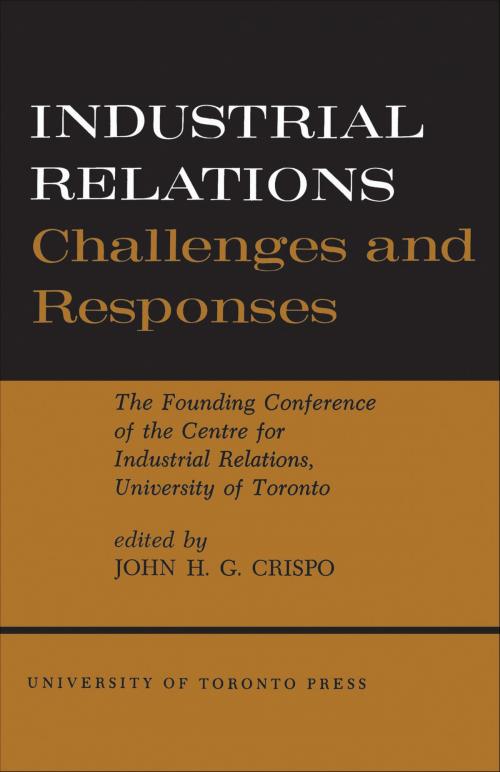Industrial Relations
Challenges and Responses
Nonfiction, Social & Cultural Studies, Political Science, Politics, Labour & Industrial Relations, Economic Conditions, Economic Policy| Author: | ISBN: | 9781442637870 | |
| Publisher: | University of Toronto Press, Scholarly Publishing Division | Publication: | December 15, 1966 |
| Imprint: | Language: | English |
| Author: | |
| ISBN: | 9781442637870 |
| Publisher: | University of Toronto Press, Scholarly Publishing Division |
| Publication: | December 15, 1966 |
| Imprint: | |
| Language: | English |
Industrial relations, which in the past have focused almost entirely on union-management relations, have recently been expanded to include such new areas of interest as manpower and poverty problems. At the University of Toronto a new Centre for Industrial Relations has been established, a research-oriented institution whose primary objective is to further scholarly investigations into all phases of industrial relations. To launch the new Centre a conference was held with distinguished Canadian and international authorities invited to discuss the challenges and responses for Industrial Relations in the next decade, from various points of view. This volume, based on the papers presented, will be a welcome contribution to knowledge in this challenging field.
In Part I, "An International Perspective," David A. Morse considers the conference's general theme in terms of its world-wide ramifications. Part II, "Collective Bargaining in an Age of Change," is devoted mainly to a discussion of the impact of industrial change on collective-bargaining institutions and practices. James R. Bright begins with a reminder that there are two schools of thought about the effect of automation upon such variables as skill and wage differentials. Then Frederick Harbison and Arnold R. Weber assess the recent record of collective bargaining: Professor Harbison provides a wide-ranging analysis of the performance of the American collective-bargaining system to date, and Professor Weber describes the effect of technological change upon the respective power of union and management, upon negotiating procedures, and upon the substantive results of collective bargaining. Harry W. Arthurs explores the role of law in coping with change, especially the technological variety. The third part of the volume, "On the Frontier of Industrial Relations," considers two of the many new industrial relations problems: Wilbert E. Moore, discussing the individual in an organizational society, asks for a reconsideration of the roles of institutional responses to the challenges posed by industrialization. Finally, there are two discussions devoted to one of the most pressing economic and social problems: poverty. The Honourable Maurice Sauvé, who, as Canada's Minister of Forestry, is in charge of the Agriculture Rehabilitation and Development Act, discusses the earnest response of governments to the challenge of poverty; Tom Cosgrove, discussing the United States "war on poverty," reviews the dimensions of the challenge posed by poverty in the United States and outlines the federal legislative response to date.
These provocative contributions should be received with great interest by representatives of labour, management, and government, as well as by those members of the public who are concerned with the problems of a growing industrial society.
Industrial relations, which in the past have focused almost entirely on union-management relations, have recently been expanded to include such new areas of interest as manpower and poverty problems. At the University of Toronto a new Centre for Industrial Relations has been established, a research-oriented institution whose primary objective is to further scholarly investigations into all phases of industrial relations. To launch the new Centre a conference was held with distinguished Canadian and international authorities invited to discuss the challenges and responses for Industrial Relations in the next decade, from various points of view. This volume, based on the papers presented, will be a welcome contribution to knowledge in this challenging field.
In Part I, "An International Perspective," David A. Morse considers the conference's general theme in terms of its world-wide ramifications. Part II, "Collective Bargaining in an Age of Change," is devoted mainly to a discussion of the impact of industrial change on collective-bargaining institutions and practices. James R. Bright begins with a reminder that there are two schools of thought about the effect of automation upon such variables as skill and wage differentials. Then Frederick Harbison and Arnold R. Weber assess the recent record of collective bargaining: Professor Harbison provides a wide-ranging analysis of the performance of the American collective-bargaining system to date, and Professor Weber describes the effect of technological change upon the respective power of union and management, upon negotiating procedures, and upon the substantive results of collective bargaining. Harry W. Arthurs explores the role of law in coping with change, especially the technological variety. The third part of the volume, "On the Frontier of Industrial Relations," considers two of the many new industrial relations problems: Wilbert E. Moore, discussing the individual in an organizational society, asks for a reconsideration of the roles of institutional responses to the challenges posed by industrialization. Finally, there are two discussions devoted to one of the most pressing economic and social problems: poverty. The Honourable Maurice Sauvé, who, as Canada's Minister of Forestry, is in charge of the Agriculture Rehabilitation and Development Act, discusses the earnest response of governments to the challenge of poverty; Tom Cosgrove, discussing the United States "war on poverty," reviews the dimensions of the challenge posed by poverty in the United States and outlines the federal legislative response to date.
These provocative contributions should be received with great interest by representatives of labour, management, and government, as well as by those members of the public who are concerned with the problems of a growing industrial society.















